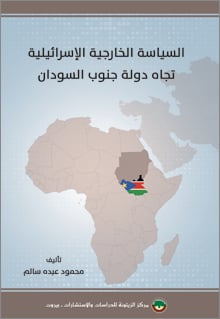Israel’s relationship with South Sudan dates back to the late 1960s, long before South Sudan’s official independence in July 2011. Israel aimed to support leaders of the armed rebellion in South Sudan as part of a broader strategy to build ties with non-Arab and non-Muslim minorities in the Arab region, ultimately serving Israel’s strategic interests.
As part of a study examining Israeli foreign policy toward South Sudan since its independence on 9/7/2011, al-Zaytouna Centre for Studies and Consultations has released a new 83-page book titled Israeli Foreign Policy Toward South Sudan: The Politics of Forging a Strategic Ally in the Nile Basin and the Horn of Africa. Authored by Mahmoud Abdou Salem, the book explores the strategic foundations, determinants, objectives, tools and manifestations of Israel’s policy, as well as its impact on the Arab and regional landscape. The book is available for free download.
| >> Click here to download: Book: Israeli Foreign Policy Toward South Sudan |
The significance of this book lies in its examination of Israel’s strategic orientation towards Africa, particularly the Nile Basin countries, with South Sudan at the heart of this region. As water-related issues are poised to escalate tensions in the coming years, understanding Israel’s role becomes increasingly important. The normalization of relations between Sudan and Israel in 2020 has further amplified the need to explore Israeli policies in the Nile Basin and their potential repercussions.
This book highlights that the Arab-Israeli conflict is a key factor shaping Israeli foreign policy toward South Sudan, as it is directly tied to Israel’s existence and survival. The true test for South Sudan will arise when it faces a situation that compels it to choose between aligning with the Arab states or with Israel.
| >> Click here to download: Book: Israeli Foreign Policy Toward South Sudan |







 ||
||

Leave A Comment